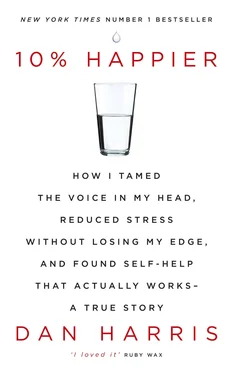You could hear the surprise in Charlie’s voice as he picked up the verbal baton and started to introduce the weather guy, Tony Perkins. Diane, meanwhile, looked genuinely worried for me, making a series of quick, anxious glances in my direction.
As soon as the weathercast began, Charlie shot out of his seat and ran over to see if I was okay. The producers were buzzing in my earpiece. Stagehands and camera operators were crowding around. No one seemed to know what had happened. They probably thought I’d had a stroke or something. I insisted I had no idea what went wrong. But as the panic subsided, humiliation rushed in; I knew with rock-solid certitude that, after having spent the previous decade of my professional life trying to cultivate a commanding on-air persona, I had just lost it in front of a national audience.
My superiors expressed sincere concern over the incident. When they asked what happened, though, I lied and said I didn’t know—that it must have been a fluke. I was ashamed, and also afraid. I thought that if I admitted the truth, that I had just had a panic attack, it would expose me as a fraud, someone who had no business anchoring the news. For whatever reason, they seemed to accept my explanation. To this day, I’m not sure why. Maybe it was because it all happened so quickly, or because it was out of character, or perhaps because I managed to get through my next newscast, just an hour later, without a hitch. In the news business, memories are mercifully short; everyone moved on to the next crisis.
I called my mom from backstage. She had been watching, and she knew exactly what was up. She’d always been impossible for me to fool. I was frantic, but her response, a mixture of the maternal and the clinical, was enormously comforting. Within hours, she had me on the phone with a psychiatrist colleague from her hospital in Boston. This was the second shrink I had consulted since returning from Iraq. It never crossed my mind to mention my drug use to him, because I hadn’t gotten high in the days or weeks leading up to the incident.
Stage fright seemed like a reasonable enough explanation. Performance anxiety had actually dogged me throughout my entire life, which, of course, made my choice of profession a little odd. One of the only lighter moments in the whole crisis was when I jokingly said to my mom that my career up until this point had been a triumph of narcissism over fear. I had experienced a few minor episodes of panic before this—in Bangor in 1993, I nearly fainted when my boss announced that she wanted me to do my first live shot that night—but a meltdown of this magnitude was unprecedented. I was put on an immediate, steady dose of Klonopin, an antianxiety medication, which seemed to bring things under control. For about a week, as I became habituated to the drug, it gave me a pleasant, dopey feeling. With the Klonopin on board, you could have marched an army of crazed chimps armed with nunchucks and ninja stars into my apartment and I would have remained calm.
Meanwhile, I kept on partying. Which is how, a little over a year later, it happened again. Same basic scenario: I was at the news desk on GMA . The terror cut straight through the Klonopin even before I started to read the first story. The anchors tossed it to me, and from the very first word you could hear my voice getting thinner as my throat constricted. I had five stories to get through, and no respite, no lifeline. I was determined, though, to make it all the way.
I had to stop to catch my breath at a few points, but each time I would then physically will my face back up toward the camera and start reading again. This verbal Bataan Death March continued through four stories until I arrived at the “kicker” (news-speak for the requisite light, closing note), which was about the Miracle-Gro company coming out with a plant that blossoms with the words I LOVE YOU on it. As I read the last words off the prompter, I even felt confident enough to attempt a little extemporizing, although it fell flat. “We’ll keep tuned—stay tuned on that.” (Halfhearted laugh; awkward pause.) “Now to Tony for more on the weather.”
This time, there was no crowd hovering around me after it ended. None of my colleagues or friends said anything to me at all. I hid it well enough that I don’t think anyone even knew it had happened.
I may have gotten away with it, but once again I knew full well what had gone down, and I went into DEFCON 1. If I couldn’t reliably speak on the air—even while taking antianxiety meds—my entire working future was up for grabs. From a professional standpoint, this was an existential issue.
My folks found me a new psychiatrist—now the third shrink I’d seen since returning from Iraq—and purportedly the “best guy” in New York City for panic disorders. He was a tall, sturdy man in his mid-fifties named Dr. Andrew Brotman. He had a twinkle in his eye and an un-ironic salt-and-pepper goatee. In our first meeting, he asked me a series of questions, trying to get to the source of the problem. One of them was, “Do you do drugs?”
Sheepishly, I said, “Yes.”
He leaned back in his large office chair and gave me a look that seemed to say, Okay, dummy. Mystery solved.
He explained that frequent cocaine use increases the levels of adrenaline in the brain, which dramatically ups the odds of having a panic attack. He told me that what I had experienced on air was an overwhelming jolt of mankind’s ancient fight-or-flight response, which evolved to help us react to attacks by saber-toothed tigers or whatever. Except in this case, I was both the tiger and the dude trying to avoid becoming lunch.
The doctor decreed in no uncertain terms that I needed to stop doing drugs—immediately. Faced with the potential demise of my career, it was a pretty obvious call. I agreed then and there to go cold turkey. He did not think I was a heavy enough user to require sweating it out in rehab. He did, however, say I needed to take better care of myself, with a steady regimen of exercise, sleep, healthy food, and temperance. He compared it to the way trainers take good care of racehorses. He also suggested that I come back to see him twice a week.
As I sat there in Dr. Brotman’s office, the sheer enormity of my mindlessness started to sink in. All of it: from maniacally pursuing airtime, to cavalierly going into war zones without considering the psychological impact, to using cocaine and ecstasy for a synthetic squirt of replacement adrenaline. It was as if I had been sleepwalking through the entire cascade of moronic behavior.
It was now thunderously clear to me that I needed to make changes—beyond just giving up drugs. Psychotherapy seemed like a reasonable route. This is what people like me did when things got rough, right? I mean, even Tony Soprano had a therapist. So I agreed: I would come back twice a week.
The sessions were held in Brotman’s ground-floor office in a cavernous hospital located in an extremely inconvenient part of Manhattan. Initially, the principal topic of our biweekly sessions was, of course, drugs. While I may not have been physically addicted, I was certainly psychologically hooked. I missed getting high so badly that it was the first thing I thought about in the morning and the last thing I fantasized about before I drifted off to sleep. I’d had some of the happiest moments of my life while high, and pulling the plug was wrenching. I worried I might never feel happy again—that I’d shorted out my brain circuitry for pleasure. Certain friendships had to be sacrificed because simply being around some of the people I’d partied with was too powerful a trigger. I went through the various KüblerRoss stages of grief, including sadness, anger, and a robust phase of bargaining, where I fruitlessly tried to convince the doctor to let me have a big night, like, maybe once a month. Comments like these would inevitably provoke Brotman to pull what I soon learned was a signature move: leaning back in his chair and shooting me a skeptical look that sent the following nonverbal message: Really, asshole?
Читать дальше












